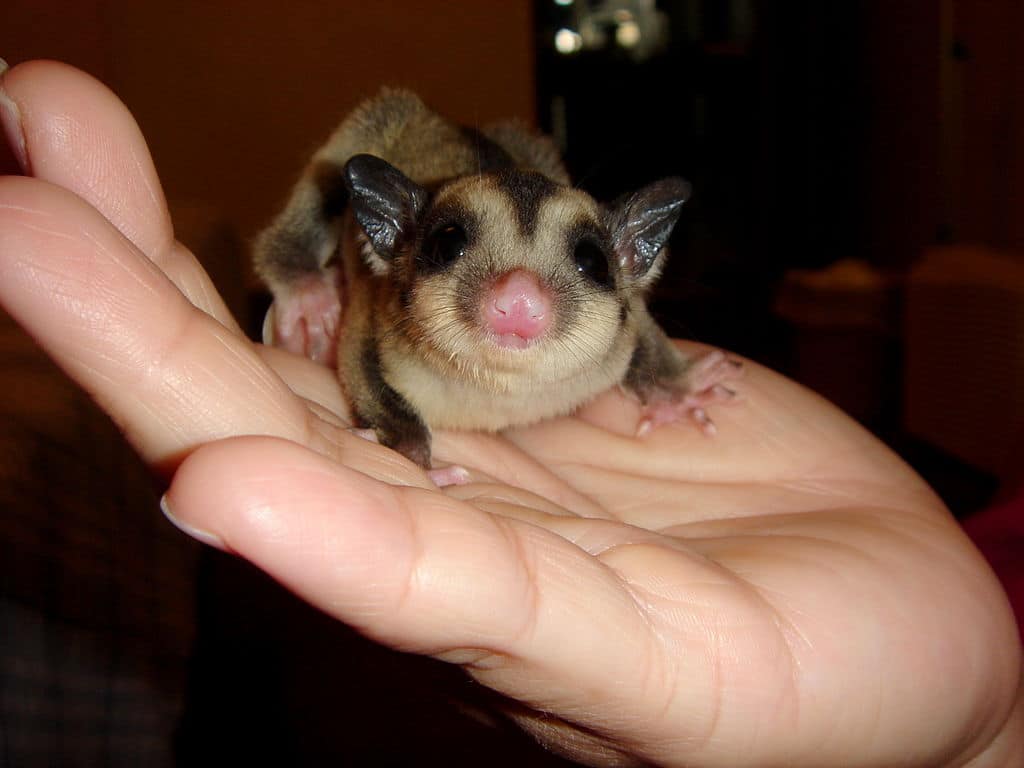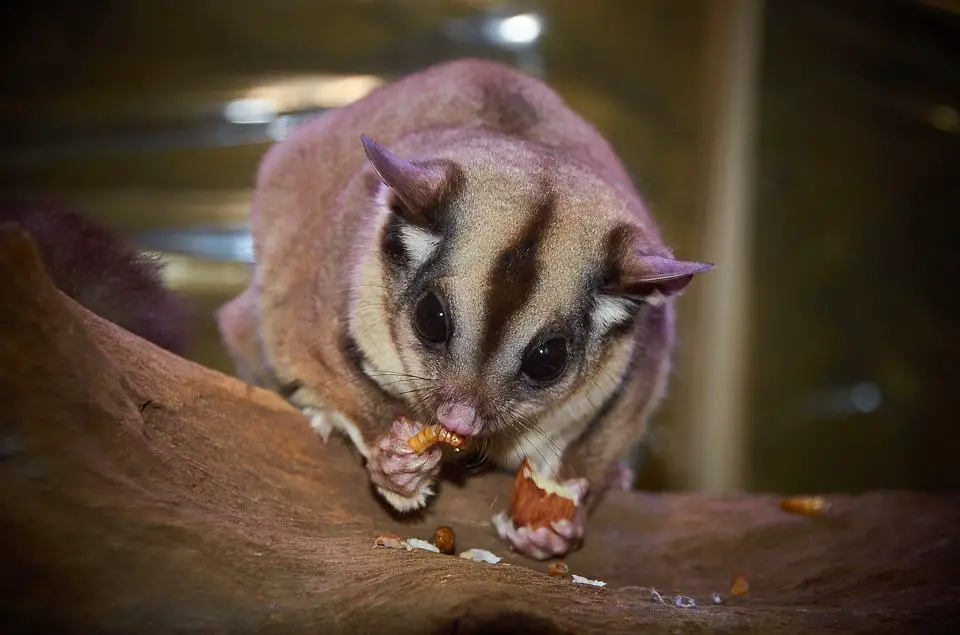Sugar gliders are adorable marsupials that have quickly become some of the most popular exotic pets. Their adorable appearance combined with their docile and affectionate temperaments has stolen the hearts of many people around the world. However, due to the fact that they are exotic animals, many people have questions about them.
One question that people often have is “do sugar gliders bite?”
The answer to that question is a little bit more complicated than just a yes or no answer. Sugar gliders do have teeth, so yes, they are capable of biting. However, they do not bite for no reason. They’re not aggressive animals by any means, and will only bite when they feel like they have to.
Let’s take a closer look at this behavior and look at some ways how to prevent bites from happening.
Do Sugar gliders bite their owner?

Sugar gliders can bite their owners when they feel stressed, scared, or angered. Biting is their main way to defend themselves against threats, so they’ll surely use it if they feel that they need to.
You have to keep in mind that they are in essence wild animals. Sure, most are bred in captivity, but they will never be truly domesticated like a dog or a cat would. Because of that, they retain a lot of their wild instincts. If they feel like they are being threatened, their instincts take over and they will bite.
Nevertheless, while sugar gliders can indeed bite, whether they will in fact bite is something that you have a lot of control over. There are several preventative measures that you can take to prevent this behavior from happening. If you treat your glider well, bites are rare.
Let’s first take a closer look at all the possible reasons why your sugar glider might bite and then take a look at how to prevent each of them.
Why is my sugar glider biting me?
In order to stop your sugar glider from setting its teeth in you, you first have to understand why they’re doing it in the first place. Here are the most common reasons why sugar gliders bite their owners.
1. Fear & anger
In the wild, sugar gliders are prey animals that have a lot to fear from the world around them. Many animals want to eat them, which is why they’re quite easy to frighten. A loud noise, an unfamiliar smell, or unexpected rapid movements are enough to set them off.
Being scared triggers a fight-or-flight response. When this happens, their instinct takes over and they will either try to run away or fight, which for sugar gliders means biting.
Similarly, when you anger your glider by doing something to them that they do not enjoy or that hurts them they might bite to get you to stop.
2. Stress
A sugar glider that lives in a stressful environment is more likely to bite than one that lives in a relaxed environment. Stressed out, they’re much more likely to perceive things that are not dangerous as threats, which can make them scared, which can lead to biting.
3. Not enough bonding
Bonding with your glider is very important. If you do not spend enough time on the bonding process they will not recognize you as being a harbor of safety. Instead, they will see you as a giant that can crush them at any moment.
If you put yourself in your pet’s position it’s easy to see why bonding is so important. You have to win their trust because they’re such small animals and because you are so big. Combine this with their fearful instincts and it’s easy to see why they might bite if you haven’t won their trust enough.
4. Not well socialized
This one ties in closely to the previous one, but it’s a bit different. Bonding is a very important process, but socializing is a bit different from bonding. Socializing is the process of them getting familiar with being touched, picked up, and played with.
Gliders from good, reputable breeders are typically socialized very well. They’re hand-raised and have a lot of experience from a young age with being touched by humans. As a result, they’ve come to learn that humans mean no harm and that they don’t have to defend themselves against them.
However, gliders from bad breeders will not have been raised this way and are thus not well socialized which often results in bad behavior such as biting.
5. Grooming
Sometimes the bites are not out of malice, but instead out of love. In the wild, gliders live in colonies consisting of several individuals and their babies. They have quite intricate social bonds and one of the ways they show affection and love towards their colony members is by grooming one another.
The grooming process often contains some soft love bites as well. These typically do not hurt at all and are very different from a scared bite. Be honored when your glider does this to you, as it’s a clear show of affection!
6. Mistakes
Mistakes happen. Even though sugar gliders are quite smart, they can easily mistake your finger for food when you’re hand-feeding them. Especially because in the wild they are sap-suckers, which means that they have to bite into the trees to get more food. When this happens it’s important that you do not get mad at them. Just correct them in a firm, but gentle way.
7. The teenager phase
When humans go through puberty they become rebellious and hard to deal with. The same applies to gliders. In this stage of their life, they’ll bite pretty randomly, even if there isn’t something that would normally trigger it. Luckily, this phase of their life doesn’t last all too long and the bites are typically not very painful.
How to prevent your sugar glider from biting

So, now you know the 7 most common reasons why your glider bites you. Let’s take a look at how to prevent them from happening!
1. Keep a good environment to prevent stress & fear
Stress and fear are the most common reasons why your glider bites. Luckily, they’re also quite preventable. To prevent your glider from being stressed out, the first thing to do is to make sure that their environment is good.
Start by making sure that they have a friend. They’re very social animals and do not do well when living alone. It can make them very stressed out when they do not have a friend which can result in them lashing out.
Secondly, make sure that they get good sleep. Sugar gliders are nocturnal animals, which means that they sleep during the day. If you have a house that’s very loud during the day it will prevent them from sleeping. This will make them cranky and more prone to aggression, I’m sure you can relate that you don’t feel your best after a poor night’s sleep either!
Lastly, make sure that there aren’t too many loud noises or unfamiliar smells. Gliders have an extremely strong sense of hearing and smell. If there are unfamiliar smells or noises in your house all the time your glider will be more fearful.
2. From a strong bond
When you form a strong bond with your glider, they will not see you as a threat or an enemy anymore. They’ll be totally relaxed in your hands because they trust you. As a result, biting will happen much less frequently and can even become almost completely a thing of the past.
3. Buy a well-socialized glider
If you don’t have a glider yet and are reading this article as preliminary research because you’re considering adopting one, make sure that you buy one from a good, reputable breeder that cares and loves the animals. They should be hand-raised and have experience with being handled by humans from a young age. This will familiarize them with the human touch from a young age and will make everything a lot easier.
4. Don’t do things that they don’t like
Gliders can not talk, so they cannot tell you what they don’t like. However, if you do something that they don’t like or that hurts them they will usually let you know by giving you a taste of their teeth.
Just like we train our sugar gliders not do to certain things, they also teach us to not do certain things to them.
While you should sometimes be strict with your glider and don’t let them control you, it is important that you treat them with respect and do not do things that they don’t enjoy. Often, gliders will notify you that you’re doing something that they don’t like through sound and body language before biting, so keep an eye on those.
Are sugar glider bites dangerous?
No, the bites of sugar gliders are typically not dangerous. They don’t have much bite force and while their teeth are quite sharp, their bites are not something to be feared. They’re relatively harmless and feel more like a firm pinch. Typically, their bites do not puncture the skin.
However, if they do manage to puncture the skin it’s important that you wash the wound immediately with soap and water and then use an antiseptic to prevent infection.
Final words
So, there you have it, everything you need to know about biting sugar gliders! As you now know, there can be several reasons why your glider bites. The most common ones are fear, anger, a lack of bonding, improper socialization, and simple mistakes. Luckily, this behavior is relatively easy to correct and prevent and even if you do get a bite from time to time, it’s usually nothing to worry about.
- How Long Do American Eskimo Dogs Live? Important Factors and Care Tips - September 29, 2023
- Do American Bulldogs Need Grooming? Essential Tips and Care Guidelines - September 29, 2023
- Do Bengal Cats Enjoy Playing? Essential Tips for Keeping Them Active - September 29, 2023